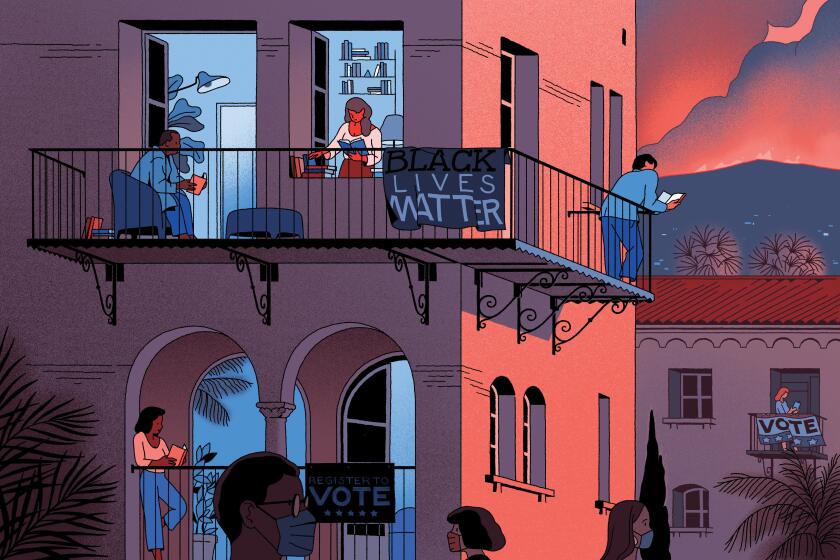Martin Amis on cancel culture, mourning and what Hitchens might have made of 2020
- Share via
On the Shelf
Inside Story
By Martin Amis
Knopf: 560 pages, $29
If you buy books linked on our site, The Times may earn a commission from Bookshop.org, whose fees support independent bookstores.
There was a time (in the 1980s and ’90s) when one would not have had to explain to readers who Martin Amis was. The British author was a kind of enfant terrible of English letters — famous for the novels “Success” and “Money,” infamous for asking for $1 million for his autobiographical novel, “The Information,” pleading that he needed the money to fix his teeth.
Now, in 2020, we get a bookend to “The Information” — “Inside Story.” Though labeled a novel, it’s impossible not to read the book, out later this month, as a thinly veiled memoir, depicting Amis’ relationships with eminent deceased writers, including Philip Larkin, Saul Bellow and especially the notoriously contrarian journalist Christopher Hitchens.
These memories, which span decades, cover everything from a tour of his multimillion-dollar Brooklyn brownstone to advice on writing. Amis spoke by phone with The Times about writing in times of crisis, cultural appropriation, cancel culture and what “The Hitch” would have made of President Trump.
You state in “Inside Story” that the 9/11 attacks made writing feel irrelevant at the time. Fiction was “partly a form of play,” you write, while reality was now “earnest.” How does it feel 19 years later to be publishing a novel in the midst of a pandemic?
The terrorist attacks were much more shocking to me than has been the coronavirus, which crept up on us. It was a thunderclap at the time, and I felt sort of canceled out by Sept. 11. But when I spoke to Zadie Smith about this at the time, she said: “Yes, but your fighting spirit gets going,” and it does, and it did.
You say it takes years for a novelist to process something traumatic properly enough to write about it.
It has to go into your frontal brain, then down your spine, into your groin, then up through your heart, it has to do a whole circuit and then you can absorb it. No satirist has written about something as it was happening; Dickens didn’t write about debtor’s prisons until it was long off the penal books. You have to respect your own subconscious and the pace at which it works.
Is it a similar process writing about the deaths of friends and loved ones?
I think it can be accelerated a bit. I’ve been trying to write this novel for 20 years. I abandoned it a couple of times. But it dawned on me very slowly after Christopher died that Saul had already been dead for 15 years and Larkin for much longer … they’re all dead. Perhaps there was a bit more freedom to write fiction about them. As I keep saying, fiction is freedom and freedom is indivisible.
Perhaps no other medium has better helped us process 2020. Our fall books special brings you the books and authors who’ve helped make sense of it.
What did you learn from writing fiction about these great men?
I learned I had nothing scandalous to report or, indeed, to feel. I discovered that I didn’t harbor any grudges and that I’m not a hater or an envier.
What do you think Hitchens would make of Trump and the world he’s made?
There’s no way of really knowing, and I have to control myself about making assumptions. He hated the Clintons, and while I’m sure he would be appalled [by Trump], I don’t know quite how he would react. He was not for nothing known as a contrarian, and he got many things wrong. Part of his charm as an essayist is that you don’t go to him for common sense.
You said you’re currently writing a book about race in America. Are you concerned about people looking askance at that or accusing you of cultural appropriation?
The way the term appropriation is used means confiscation. But when you appropriate something to write about it, the subject is still there. Saul had this in one of his greatest pieces of writing, a short story called “A Silver Dish,” based on a story that was told to him by a very old friend. And the friend, when he read it, was upset and aggrieved and felt he’d been appropriated. But Saul wrote back, “You tell your story, it is still there, it is just my weird version of the story.” To take another example, when I write about the Holocaust [in “Time’s Arrow” or “Zone of Interest”], it doesn’t disappear. The subject is still there.
Celebrities endorsed ‘American Dirt’ — then the reactions on Twitter turned negative. Cries of appropriation — and barb-wire dinner pieces — spark scorn for book
But we are living an era of so-called cancel culture, and you are an older white male writing about race in America.
It is rather an extreme case for me to take on slavery and lynching, but I do it and it is an effort of the imagination. If it is honestly made and the effort is put in, I don’t see an objection. Having decided that, I won’t tailor what I’ve made to appease objections that I don’t consider valid. It’s not just cancel culture, it’s actually the urge to censor or censure people trying to think outside their own experience, which is what fiction is, in my view.
More to Read
Sign up for our Book Club newsletter
Get the latest news, events and more from the Los Angeles Times Book Club, and help us get L.A. reading and talking.
You may occasionally receive promotional content from the Los Angeles Times.








